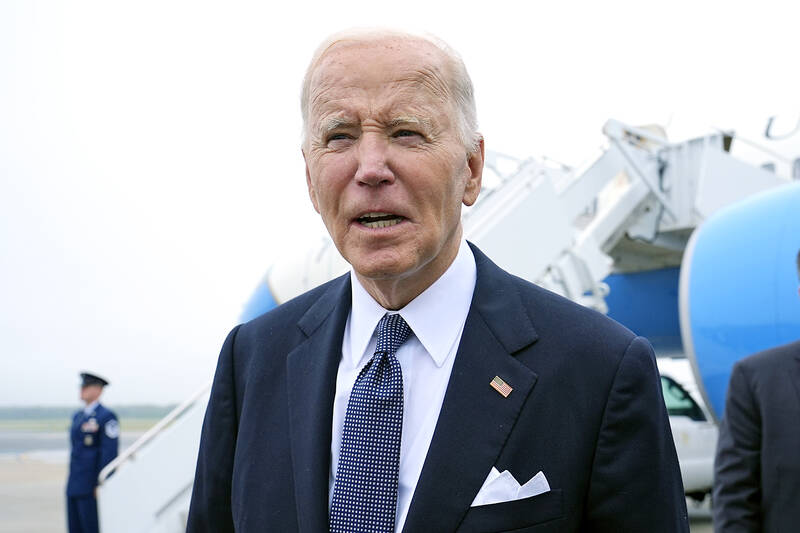US President Joe Biden on Sunday approved US$567 million in defense assistance for Taiwan, the White House said.
While the US does not officially recognize Taiwan diplomatically, it is Taipei’s key partner and a major provider of weapons — a point of consternation for Beijing, which has repeatedly called on Washington to stop arming the nation, which it claims is part of its territory.
The White House in a brief statement said that Biden had delegated the US secretary of state “to direct the drawdown of up to US$567 million in defense articles and services of the Department of Defense, and military education and training, to provide assistance to Taiwan.”

Photo: AP
The package is nearly twice the size of the US$345 million in defense support approved in July last year.
However, the statement did not provide specific details about the latest package.
In a Defense News report published on Sept. 21, an unnamed US official was quoted as saying the package would “fund training, stockpiles, anti-armor weapons, air defense and multi-domain awareness.”
It would also include drones, which are key to the US’ and Taiwan’s “asymmetric” strategy to defend the nation against China’s much larger military, the report said.
The Pentagon is working on a third aid package for Taiwan and the Biden administration plans to complete it before the end of its term in January next year, the report added.
The US in April approved billions of US dollars in military aid for Taiwan in the face of an increasingly assertive China.
China maintains a near-daily presence of fighter jets, drones and warships around Taiwan.
Additional reporting by CNA

CHAOS: Iranians took to the streets playing celebratory music after reports of Khamenei’s death on Saturday, while mourners also gathered in Tehran yesterday Iranian Supreme Leader Ayatollah Ali Khamenei was killed in a major attack on Iran launched by Israel and the US, throwing the future of the Islamic republic into doubt and raising the risk of regional instability. Iranian state television and the state-run IRNA news agency announced the 86-year-old’s death early yesterday. US President Donald Trump said it gave Iranians their “greatest chance” to “take back” their country. The announcements came after a joint US and Israeli aerial bombardment that targeted Iranian military and governmental sites. Trump said the “heavy and pinpoint bombing” would continue through the week or as long

TRUST: The KMT said it respected the US’ timing and considerations, and hoped it would continue to honor its commitments to helping Taiwan bolster its defenses and deterrence US President Donald Trump is delaying a multibillion-dollar arms sale to Taiwan to ensure his visit to Beijing is successful, a New York Times report said. The weapons sales package has stalled in the US Department of State, the report said, citing US officials it did not identify. The White House has told agencies not to push forward ahead of Trump’s meeting with Chinese President Xi Jinping (習近平), it said. The two last month held a phone call to discuss trade and geopolitical flashpoints ahead of the summit. Xi raised the Taiwan issue and urged the US to handle arms sales to

BIG SPENDERS: Foreign investors bought the most Taiwan equities since 2005, signaling confidence that an AI boom would continue to benefit chipmakers Taiwan Semiconductor Manufacturing Co’s (TSMC, 台積電) market capitalization swelled to US$2 trillion for the first time following a 4.25 percent rally in its American depositary receipts (ADR) overnight, putting the world’s biggest contract chipmaker sixth on the list of the world’s biggest companies by market capitalization, just behind Amazon.com Inc. The site CompaniesMarketcap.com ranked TSMC ahead of Saudi Aramco and Meta Platforms Inc. The Taiwanese company’s ADRs on Tuesday surged to US$385.75 on the New York Stock Exchange, as strong demand for artificial intelligence (AI) applications led to chip supply constraints and boost revenue growth to record-breaking levels. Each TSMC ADR represents

Pro-democracy media tycoon Jimmy Lai’s (黎智英) fraud conviction and prison sentence were yesterday overturned by a Hong Kong court, in a surprise legal decision that comes soon after Lai was jailed for 20 years on a separate national security charge. Judges Jeremy Poon (潘兆初), Anthea Pang (彭寶琴) and Derek Pang (彭偉昌) said in the judgement that they allowed the appeal from Lai, and another defendant in the case, to proceed, as a lower court judge had “erred.” “The Court of Appeal gave them leave to appeal against their conviction, allowed their appeals, quashed the convictions and set aside the sentences,” the judges